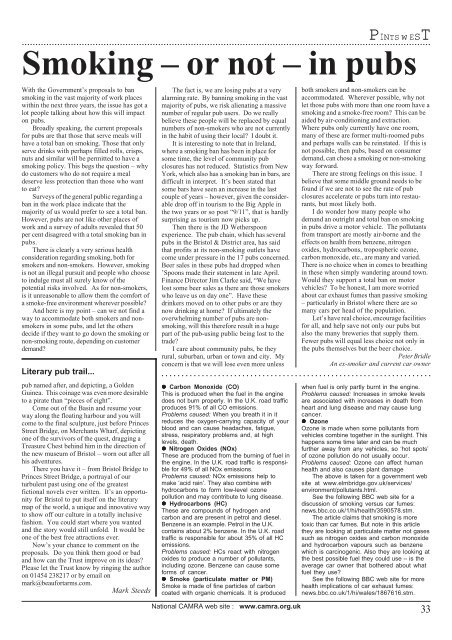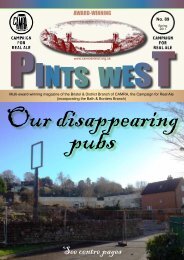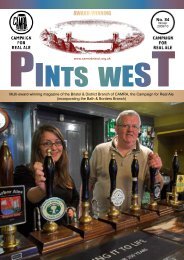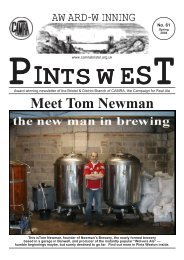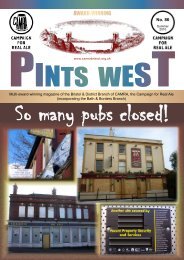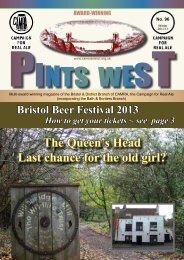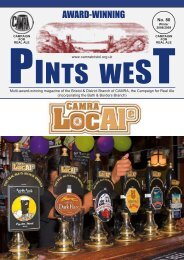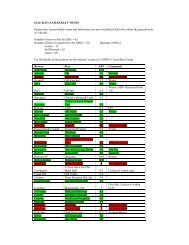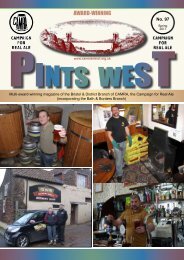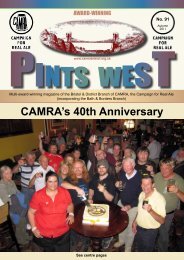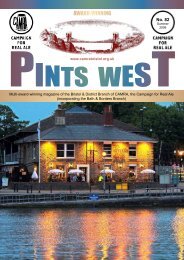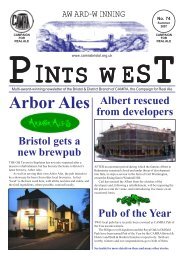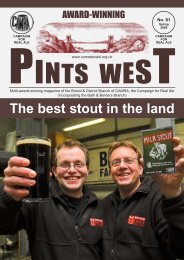Pints West 66, Summer 2005 - Bristol & District CAMRA
Pints West 66, Summer 2005 - Bristol & District CAMRA
Pints West 66, Summer 2005 - Bristol & District CAMRA
You also want an ePaper? Increase the reach of your titles
YUMPU automatically turns print PDFs into web optimized ePapers that Google loves.
PINTS WEST......................................................................................................................................................Smoking – or not – in pubsWith the Government’s proposals to bansmoking in the vast majority of work placeswithin the next three years, the issue has got alot people talking about how this will impacton pubs.Broadly speaking, the current proposalsfor pubs are that those that serve meals willhave a total ban on smoking. Those that onlyserve drinks with perhaps filled rolls, crisps,nuts and similar will be permitted to have asmoking policy. This begs the question – whydo customers who do not require a mealdeserve less protection than those who wantto eat?Surveys of the general public regarding aban in the work place indicate that themajority of us would prefer to see a total ban.However, pubs are not like other places ofwork and a survey of adults revealed that 50per cent disagreed with a total smoking ban inpubs.There is clearly a very serious healthconsideration regarding smoking, both forsmokers and non-smokers. However, smokingis not an illegal pursuit and people who chooseto indulge must all surely know of thepotential risks involved. As for non-smokers,is it unreasonable to allow them the comfort ofa smoke-free environment wherever possible?And here is my point – can we not find away to accommodate both smokers and nonsmokersin some pubs, and let the othersdecide if they want to go down the smoking ornon-smoking route, depending on customerdemand?The fact is, we are losing pubs at a veryalarming rate. By banning smoking in the vastmajority of pubs, we risk alienating a massivenumber of regular pub users. Do we reallybelieve these people will be replaced by equalnumbers of non-smokers who are not currentlyin the habit of using their local? I doubt it.It is interesting to note that in Ireland,where a smoking ban has been in place forsome time, the level of community pubclosures has not reduced. Statistics from NewYork, which also has a smoking ban in bars, aredifficult in interpret. It’s been stated thatsome bars have seen an increase in the lastcouple of years – however, given the considerabledrop off in tourism to the Big Apple inthe two years or so post “9/11”, that is hardlysurprising as tourism now picks up.Then there is the JD Wetherspoonexperience. The pub chain, which has severalpubs in the <strong>Bristol</strong> & <strong>District</strong> area, has saidthat profits at its non-smoking outlets havecome under pressure in the 17 pubs concerned.Beer sales in these pubs had dropped when’Spoons made their statement in late April.Finance Director Jim Clarke said, “We havelost some beer sales as there are those smokerswho leave us on day one”. Have thesedrinkers moved on to other pubs or are theynow drinking at home? If ultimately theoverwhelming number of pubs are nonsmoking,will this therefore result in a hugepart of the pub-using public being lost to thetrade?I care about community pubs, be theyrural, suburban, urban or town and city. Myconcern is that we will lose even more unlessboth smokers and non-smokers can beaccommodated. Wherever possible, why notlet those pubs with more than one room have asmoking and a smoke-free room? This can beaided by air-conditioning and extraction.Where pubs only currently have one room,many of these are former multi-roomed pubsand perhaps walls can be reinstated. If this isnot possible, then pubs, based on consumerdemand, can chose a smoking or non-smokingway forward.There are strong feelings on this issue. Ibelieve that some middle ground needs to befound if we are not to see the rate of pubclosures accelerate or pubs turn into restaurants,but most likely both.I do wonder how many people whodemand an outright and total ban on smokingin pubs drive a motor vehicle. The pollutantsfrom transport are mostly air-borne and theeffects on health from benzene, nitrogenoxides, hydrocarbons, tropospheric ozone,carbon monoxide, etc., are many and varied.There is no choice when in comes to breathingin these when simply wandering around town.Would they support a total ban on motorvehicles? To be honest, I am more worriedabout car exhaust fumes than passive smoking– particularly in <strong>Bristol</strong> where there are somany cars per head of the population.Let’s have real choice, encourage facilitiesfor all, and help save not only our pubs butalso the many breweries that supply them.Fewer pubs will equal less choice not only inthe pubs themselves but the beer choice.Peter BridleAn ex-smoker and current car ownerLiterary pub trail... ...................................................................pub named after, and depicting, a GoldenGuinea. This coinage was even more desirableto a pirate than “pieces of eight”.Come out of the Basin and resume yourway along the floating harbour and you willcome to the final sculpture, just before PrincesStreet Bridge, on Merchants Wharf, depictingone of the survivors of the quest, dragging aTreasure Chest behind him in the direction ofthe new museum of <strong>Bristol</strong> – worn out after allhis adventures.There you have it – from <strong>Bristol</strong> Bridge toPrinces Street Bridge, a portrayal of ourturbulent past using one of the greatestfictional novels ever written. It’s an opportunityfor <strong>Bristol</strong> to put itself on the literarymap of the world, a unique and innovative wayto show off our culture in a totally inclusivefashion. You could start where you wantedand the story would still unfold. It would beone of the best free attractions ever.Now’s your chance to comment on theproposals. Do you think them good or badand how can the Trust improve on its ideas?Please let the Trust know by ringing the authoron 01454 238217 or by email onmark@beaufortarms.com.Mark Steeds# Carbon Monoxide (CO)This is produced when the fuel in the enginedoes not burn properly. In the U.K. road trafficproduces 91% of all CO emissions.Problems caused: When you breath it in itreduces the oxygen-carrying capacity of yourblood and can cause headaches, fatigue,stress, respiratory problems and, at highlevels, death.# Nitrogen Oxides (NOx)These are produced from the burning of fuel inthe engine. In the U.K. road traffic is responsiblefor 49% of all NOx emissions.Problems caused: NOx emissions help tomake ‘acid rain’. They also combine withhydrocarbons to form low-level ozonepollution and may contribute to lung disease.# Hydrocarbons (HC)These are compounds of hydrogen andcarbon and are present in petrol and diesel.Benzene is an example. Petrol in the U.K.contains about 2% benzene. In the U.K. roadtraffic is responsible for about 35% of all HCemissions.Problems caused: HCs react with nitrogenoxides to produce a number of pollutants,including ozone. Benzene can cause someforms of cancer.# Smoke (particulate matter or PM)Smoke is made of fine particles of carboncoated with organic chemicals. It is producedwhen fuel is only partly burnt in the engine.Problems caused: Increases in smoke levelsare associated with increases in death fromheart and lung disease and may cause lungcancer.# OzoneOzone is made when some pollutants fromvehicles combine together in the sunlight. Thishappens some time later and can be muchfurther away from any vehicles, so ‘hot spots’of ozone pollution do not usually occur.Problems caused: Ozone can affect humanhealth and also causes plant damageThe above is taken for a government website at www.elmbridge.gov.uk/services/environment/pollutants.html.See the following BBC web site for adiscussion of smoking versus car fumes:news.bbc.co.uk/1/hi/health/3590578.stm.The article claims that smoking is moretoxic than car fumes. But note in this articlethey are looking at particulate matter not gasessuch as nitrogen oxides and carbon monoxideand hydrocarbon vapours such as benzenewhich is carcinogenic. Also they are looking atthe best possible fuel they could use – is theaverage car owner that bothered about whatfuel they use?See the following BBC web site for morehealth implications of car exhaust fumes:news.bbc.co.uk/1/hi/wales/1867616.stm.National <strong>CAMRA</strong> web site : www.camra.org.uk33


